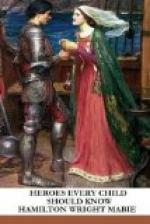CHAPTER XIII
RICHARD THE LION-HEARTED
King Richard, with his chief nobles, disembarked at Acre an hour before noon on the 8th day of June, 1191. I had the good fortune to see him without difficulty, by the favour of one who has a charge in the ordering of the harbour. Nor was this a small thing, for there was such a press and crowding of men.
The King was as noble a warrior as ever I have seen. Some that I have known were taller of stature, but never one that bore himself more bravely and showed more likelihood of strength and courage. They that are learned in such things said that his arms were over-long for the height of his body; but this is scarce a fault in a swordsman, another inch of length adding I know not how much of strength to a blow. He was of a ruddy complexion, his eyes blue, with a most uncommon fire in them, such as few could dare to look into if his wrath was kindled, his countenance, such as befitted a ruler of men, being of an aspect both generous and commanding.
Some ten days after his coming to the camp King Richard was taken with sickness. This was never altogether absent, but it grew worse, as might indeed be looked for, in the heats of summer. The King sickened on the day which the Christians celebrate as the Feast of St. Barnabas. [Footnote: The longest day according to the old calendar. So the old adage has it: “Barnaby bright, Barnaby bright; Longest day and shortest night.”] I was called to see him, having, as I have said, no small fame as a healer. Never have I seen a sick man more intractable. My medicine he swallowed readily, I may say, even greedily. Had I suffered it, he would have taken it at intervals shorter by far than I ordered. Doubtless he thought that the more a man has of a good thing, the better it is for him. (So indeed many believe, and of other things besides medicine, but wholly without reason). But in this I hindered him, leaving with those who ministered to him sufficient for one dose only.
He was troubled about many things, about the siege, which, as he justly thought, had already been too much drawn out, about King Philip of France, whom he loved not nor trusted, about his engines of war, of which the greater part had not yet reached the camp; the ships that bore them having been outsailed by the rest of the fleet. His fever was of the intermittent sort, coming upon him on alternate days. On the days when he was whole, or as nearly whole as a man sick of this ague may ever be, he was busy in the field, causing such engines as he had to be set in convenient places for the assault of the town, and in other cares such as fall to a general. When he was perforce shut in his pavilion by access of the fever, he suffered himself to take no rest. Messengers were coming and going from morning to night with news of the siege—he could never hear enough of the doings of the French




